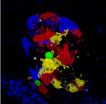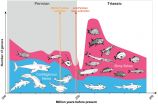(Press-News.org) HOUSTON -- (Dec. 1, 2014) - Most genes are inherited as two working copies, one from the mother and one from the father. However, in a few instances, a gene is imprinted, which means that one copy is silenced. This is called genomic imprinting. If the active copy is mutated, then disease results, even though the silenced gene copy may be normal.
Angelman syndrome, which causes learning difficulties, speech problems, seizures, jerky movements and an unusually happy disposition, results when a gene inherited from the mother in a particular area of chromosome 15 is mutated and the other copy of the gene, inherited from the father, is silenced. In a report that appears online in the journal Nature¸ Dr. Arthur Beaudet, professor of molecular and human genetics at Baylor College of Medicine and a clinical geneticist at Texas Children's Hospital, and colleagues answer the question: "Can we turn on the activity of the paternal gene?"
Angelman syndrome occurs when an infant inherits a mutated copy of the imprinted gene UBE3A from his or her mother. He or she also has a paternal copy of the gene, but it is silenced by a long ribbon of RNA called the UBE3A anti-sense transcript. (Antisense, in this case, is complementary to the ribbon of RNA, which means it binds to it and silences any activity.)
In an earlier experiment, Dr. Ben Philpott of the University of North Carolina showed that a type of drug called a topoisomerase could activate the father's copy of the gene, but the drug itself was toxic and it did not limit activation to the Angelman gene but affected all long genes.
One of Beaudet's graduate students - Linyan Meng - was writing her dissertation on Angelman syndrome and was wrestling with this problem when a member of her dissertation committee, Dr. Thomas Cooper, professor of pathology & immunology at Baylor, said he was working with a Carlsbad, Calif.-based company called Isis Pharmaceuticals that had anti-sense oligonucleotides that could turn off the antisense transcript that silenced the paternal copy of the gene. She bred a mouse in which the antisense transcript was "knocked down" and the paternal copy of the gene turned on.
"If you blocked the antisense, you could turn on the paternal copy," said Beaudet, also the Henry and Emma Meyer Chair in Molecular Genetics at Baylor. The treatment worked both in cells in the laboratory and in the live animals. The effect of the injection of the antisense oligonucleotides lasted about 16 weeks.
"It was clear from the molecular data that we were turning on the paternal copy of the gene," said Beaudet. "It is not clear how much we are able to reverse the behavioral abnormalities."
Studies in mice showed that the treatment appeared to reduce the cognitive deficits associated with Angelman syndrome. Yet more testing needs to be done.
"For the first time, we developed a sequence-specific and clinically feasible method to activate expression of the paternal Ube3a allele," said the authors in the report.
In the future, Beaudet said, researchers hope to see what happens if the gene is able to make even more protein.
He anticipates that if the laboratory and animal studies continue to be positive, a study in children with the problem could be possible in the next two to three years. Perhaps, he said, the technique could be modified to work in other diseases that result from mutations in imprinted genes.
INFORMATION:
Others who took part in the study include Amanda J. Ward, Seung Chun, C. Frank Bennett, and Frank Rigo, all of Isis Pharmaceuticals. Meng and Ward are both first authors of the report and contributed equally to it.
Funding for this work came from the National Institutes of Health (G R01 HD037283), the Angelman Syndrome Foundation, the Baylor Intellectual and Developmental Disability Research Core Grant (P30HD024064).
PHILADELPHIA-- Chronic kidney disease (CKD) affects at least one in four Americans who are older than 60 and can significantly shorten lifespan. Yet the few available drugs for CKD can only modestly delay the disease's progress towards kidney failure. Now, however, a team led by researchers at the Perelman School of Medicine at the University of Pennsylvania, has found an aspect of CKD's development that points to a promising new therapeutic strategy.
"We found that a defect in energy production in affected kidney cells plays a key role in CKD development," says Katalin ...
"I can't get the memories out of my mind!... I am right back in Vietnam, in the middle of the monsoon season at my guard post. My hands are freezing, yet sweat pours from my entire body...I smell a damp sulfur smell. Suddenly I see what's left of my buddy Troy, his head on a bamboo platter, sent back to our camp by the Viet Cong."i
This veteran of the US army, who served in Vietnam, has intense flashbacks of his decapitated friend whenever he hears a clap of thunder, touches a bamboo mat, or sees an Oriental woman. Although the traumatic incident happened decades ago in ...
A new study* that challenges the prevailing view of how bowel cancer develops in the large intestine is published today in Nature Medicine.
Cancer Research UK scientists have discovered that bowel cancer may not be restricted to starting its journey in the stem cells in the lining of the intestines as previously thought.
The researchers, based at the Wellcome Trust Centre for Human Genetics, studied a hereditary faulty gene which can cause bowel cancer in middle age. The faulty gene causes normal cells to behave like immortal stem cells and develop tumours of their ...
Many of the complex computer models which are used to predict climate change could be missing an important ozone 'feedback' factor in their calculations of future global warming, according to new research led by the University of Cambridge and published today (1 December) in the journal Nature Climate Change.
Computer models play a crucial role in informing climate policy. They are used to assess the effect that carbon emissions have had on the Earth's climate to date, and to predict possible pathways for the future of our climate.
Increasing computing power combined ...
This news release is available in French. Micronutrient malnutrition affects more than 2 billion people. Researchers working at the Crop Development Centre at the University of Saskatchewan are seeking long term solutions to help to alleviate the increasing micronutrient malnutrition problem by enriching food grains with essential micronutrients through breeding and appropriate management practices, collectively known as biofortification.
Chickpea (Cicer arietinum L.) is considered an excellent whole food as source of dietary proteins, carbohydrates, micronutrients ...
DARIEN, IL - A new study shows that obstructive sleep apnea is associated with impaired exercise capacity, which is an indicator of increased cardiovascular risk.
Results show that the predicted peak oxygen uptake, a measure of aerobic physical fitness, was significantly lower in people with moderate to severe obstructive sleep apnea than in controls. Further analysis found that sleep apnea severity alone explained 16.1 percent of this variability.
"We found a significant association indicating that there is likely a very strong independent relationship between obstructive ...
Obese patients who have undergone bariatric surgery to shed weight should take the supplements prescribed to them to protect their eyes. Taking in too little Vitamin A, in particular, could in some cases actually cause night blindness, dry eyes, corneal ulcers, and in extreme cases total blindness. This advice comes from Rui Azevedo Guerreiro and Rui Ribeiro of the Centro Hospitalar de Lisboa Central in Portugal, who reviewed what little research there currently is on the occurrence of eye conditions following bariatric surgery. The review is published in Springer's journal ...
The latest research from the University of Adelaide challenges current thinking on whether many people with tooth loss really need dentures.
The findings have major implications for public dental health resources and costs for patients.
Studies conducted by the University's Australian Research Center for Population Oral Health in the School of Dentistry have found that people with tooth loss do not have their quality of life interfered with provided they still have a certain number and type of teeth left.
In dentistry terms, these patients are considered to have "shortened ...
Today, ray-finned fish, which belong to the bony fish, are by far the most biodiverse fish group in both salt- and freshwater. Their spectacular variety of forms ranges from eels, tuna, flounders and angler fish all the way to seahorses. With around 1,100 species, the second most biodiverse group is the cartilaginous fish, which are almost exclusively marine and include sharks, rays and chimaeras. Exactly why bony fish managed to prevail in different habitats is the subject of debate: Do they have a better body plan, which is suited to more ecological niches than that of ...
A study from the University of Exeter has found that male flies die earlier than their female counterparts when forced to evolve with the pressures of mate competition and juvenile survival. The results could help researchers understand the mechanisms involved in ageing.
The research, published in the journal Functional Ecology, used populations of the fly Drosophila simulans that had evolved under different selection regimes. The study shows that mate competition (sexual selection), along with survival (natural selection), is tougher on male ageing than it is on females ...

